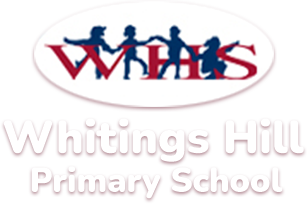Phonics & Early Reading
Early Reading & RWI Phonics
“Teach a child to read and keep that child reading and we will change everything. And I mean everything.” Jean Winterson
This quote epitomises the intent of the Read Write Inc. programme, which we use to teach phonics at Whitings Hill.
INTENT
We strive to teach children to read effectively and quickly using the Read Write Inc. Phonics programme (RWI) which includes teaching synthetic phonics, sight vocabulary, decoding and encoding words as well as spelling and accurate letter formation.
We passionately believe that teaching children to read and write independently, as quickly as possible, is one of the core purposes of a primary school. These fundamental skills not only hold the keys to the rest of the curriculum but also have a huge impact on children’s self-esteem and future life chances. Using the RWI phonics programme we teach children to:
-
Read easily, fluently and with good understanding
-
Develop the habit of reading widely and often, for both pleasure and information
-
Write clearly, accurately and coherently, adapting their language and style in and for a range of contexts, purposes and audiences
IMPLEMENTATION
-
All staff are fully trained and supported to be experts in reading and able to teach high quality reading lessons every day.
-
Teaching resources and strategies are consistent in all groups and across the school.
-
Read Write Inc. is taught with rigour and commitment.
-
Integral Read Write Inc. decodable books are used during reading lessons enabling pupils to use and apply their phonics skills.
-
Books selected for independent practice are fully decodable and match the pupils’ phonics knowledge.
-
Pupils re-read books to develop fluency, speed and expression.
-
Pupils are regularly assessed and grouped homogeneously to enable appropriate pace through the programme.
-
Reading Teachers regularly assess pupil progress and accelerate pace through the programme appropriately.
-
Pupil progress is carefully monitored by the Reading Leader through half termly data analysis
-
Pupils making slower progress are quickly identified.
-
Daily, high quality additional support for the lowest 20% is delivered by highly trained staff and is effective in closing the gap.
-
Parents are supported to help their children to learn to read by attending information sessions and via leaflets given out at Parent Consultations or available on our website.
-
Storytimes are planned daily.
-
Pupils are read high quality storybooks every day.
-
Once children complete the Read, Write, Inc. programme they move onto the teaching of spelling based on the National Curriculum.
IMPACT
-
Children enjoy and have confidence in their phonics learning. They will transfer these skills to support their reading for pleasure and writing.
-
Children know more, remember more and understand more about Phonics, demonstrating this knowledge in all areas of the curriculum involving reading and writing.
-
The large majority of children will achieve age related expectations in Phonics and this will be assessed through EYFS data and the Phonics Screening Check at the end of Year 1.
-
Parents have a clear understanding of how phonics is taught throughout the school and the impact it is having on their children. They will also understand how to further support their children with this learning at home.
-
All staff teaching phonics consistently use the correct vocabulary, lesson structure and teaching techniques to ensure all children’s needs are being met in a fair and consistent way.
